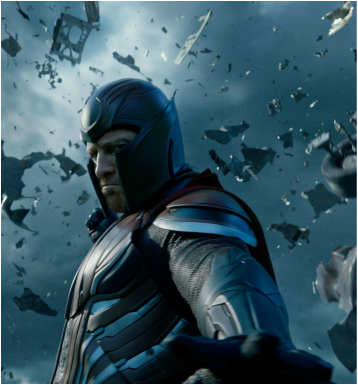Review:
"X-Men: Apocalypse"

Release Date: May 27, 2016
Rating: PG-13 Running Time: 147 minutes It’s the end of the world as the X-Men know it and director Bryan Singer feels fine. Maybe it’s because X-Men: Apocalypse is the second consecutive sequel that finds our mutant heroes staring down the threat of extinction. And maybe it’s because this finale to the X-Men prequel trilogy offers Singer another chance to conduct a soft reboot of this franchise—a franchise does nothing but soft reboot itself these days—by way of introducing a new cast playing younger versions of such X-Men as Jean Grey, Cyclops, Nightcrawler and Storm. This 1980s-set sequel’s subtitle namechecks Apocalypse, the oldest mutant to walk the Earth. Played with an absent of menace or self-awareness by an appallingly blue-painted, made-up Oscar Isaac, the all-powerful Apocalypse awakens in 1983 after spending multiple centuries entombed alive in an Egyptian pyramid and immediately sets about destroying the world in order to recreate it as he sees fit. By the side of this false god are mutants known as the Four Horsemen: Alexandra Shipp’s Storm, Olivia Munn’s Psylocke, Ben Hardy’s Angel and Michael Fassbender’s Magneto, whose faith in humanity is once shaken following a tragic turn of events. This sets up a showdown on the scale of Captain America: Civil War with between Four Horseman and the X-Men, who are led by James McAvoy’s Professor X, Jennifer Lawrence’s Mystique, Nicholas Hoult’s Beast, and a slew of new recruits who presumably will head the cast of future sequels. Singer takes his time to introduce and find a place in the X-Men franchise for Sophie Turner’s Jean Grey, Tye Sheridan’s Cyclops, and Kodi Smit-McPhee’s Nightcrawler. Smit-McPhee stands out from his fellow newcomers by best nailing the fear and curiosity that comes with his power. On the other hand, it’s hard to see much of Famke Janssen’s Jean Grey in Turner, even taking into consideration the age difference and Grey’s state of mind and maturity in Apocalypse. Grey’s learning to master her powers, so it’s not expected Turner would display the same confident and authority that Janssen exuded in X-Men. But there’s also nothing to be found in Turner’s prosaic interpretation of Grey that hints at her dangerous side. Remember, Grey actually transforms into the malevolent Dark Phoenix. Turner’s presence could mark the franchise’s first stumble in casting younger versions of the characters from the original trilogy. With the exception of Magneto, whom we know as well as we know Professor X, Singer makes no effort to allow us a glimpse of what motivates them to join the manipulative Apocalypse. Is it a sense of belonging? A desire to control and boosts their powers? A shared hatred of humanity? Angel, Psylocke and Storm are there just to fill a spot on Apocalypse’s rooster and not much else. It is particularly odd that Singer and screenwriter Simon Kinberg would give them such short shrift considering their status within the Marvel Comics universe and, at least in the case of Angel and Storm, their X-Men membership. Perhaps Singer was more concerned with mounting action sequences that would blow away the orchestrated mayhem of X-Men: Days of Future Past. In such instances, he does. In others, such as the fight between the X-Men and Apocalypse and his Four Horseman, he doesn’t top the clash of superheroes of Captain America: Civil War, but he does do a better job than Zack Snyder did with Batman v Superman: Dawn of Justice. Singer also takes advantage of the positive reaction to Evan Peters’ Quicksilver in Days of Future Past by not just building another terrific set-piece around his great speed but by allowing him to play a pivotal role in Apocalypse all the way through to the end. Given that Apocalypse isn’t much of a villain, and his bid for world domination is uninspired, this sequel once again must rely on the fractured relationship between Professor X, Magneto and Mystique to draw us into the action. Unfortunately, this is not enough. After six films, the constant debating about humanity’s merits—or lack of—between Professor X and Magneto has grown old and stale. Everything said between Professor X and Magneto has been said before under similar circumstances. It’s time for Magneto to go into hiding for a sequel or two, even though Fassbender would be missed. His emotional journey remains the most intriguing aspect of the X-Men franchise, and Singer builds the franchise’s painfully tragic moment around him in Apocalypse. On the flipside, Singer doesn’t seem to realize just how distasteful it is to have Apocalypse recruit Magneto to his cause outside the gates of Auschwitz. This represents a repugnant low for the franchise. It was impossible to tell from the original trilogy that Mystique would find herself at the heart of the moral conflict in this prequel trilogy. Lawrence, though, seems so bored by the chaos that surrounds her that you get the sense that she wants to be free of this franchise. You can’t blame her considering she’s also committed the best part of this decade to The Hunger Games franchise. Why, then, does X-Men: Apocalypse paint itself in the corner when it comes to Mystique? Then again, the franchise had the chance to recast Hugh Jackman’s Wolverine with the Matthew Vaughn-directed X-Men: First Class, but didn’t. Speaking of Wolverine, it’s not fair to reveal whether Jackman appears in Apocalypse. But, as with Mystique, it’s going to be interesting to see how this franchise handles its furry face of in future installments. Then again, as dictated by his history with this franchise, Singer won’t worry about messing around with its continuity in order to suit his narrative needs. Robert Sims Aired: May 26, 2016 Web site: http://www.foxmovies.com/movies/x-men-apocalypse |
|
